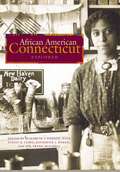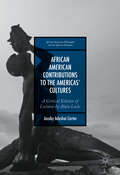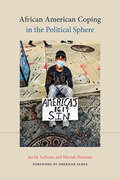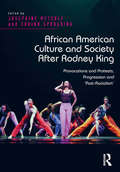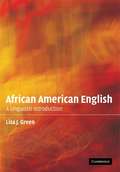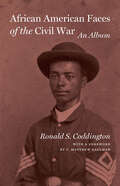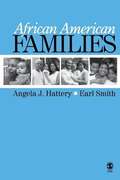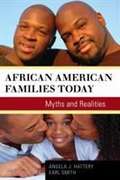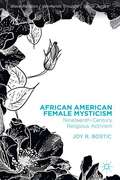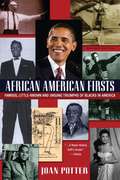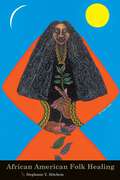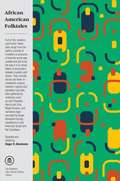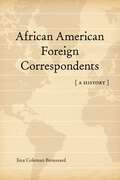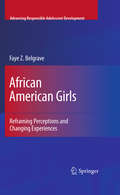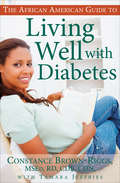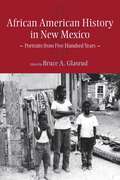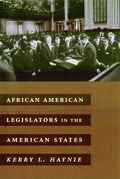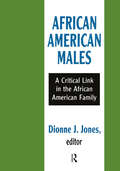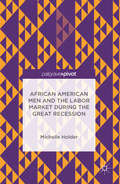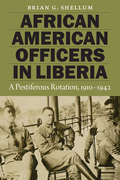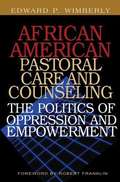- Table View
- List View
African American Connecticut Explored
by Katherine J. Harris Olivia White Elizabeth J. Normen Stacey K. Close Wm. Frank MitchellThe numerous essays by many of the state's leading historians in African American Connecticut Explored document an array of subjects beginning from the earliest years of the state's colonization around 1630 and continuing well into the 20th century. The voice of Connecticut's African Americans rings clear through topics such as the Black Governors of Connecticut, nationally prominent black abolitionists like the reverends Amos Beman and James Pennington, the African American community's response to the Amistad trial, the letters of Joseph O. Cross of the 29th Regiment of Colored Volunteers in the Civil War, and the Civil Rights work of baseball great Jackie Robinson (a twenty-year resident of Stamford), to name a few. Insightful introductions to each section explore broader issues faced by the state's African American residents as they struggled for full rights as citizens. This book represents the collaborative effort of Connecticut Explored and the Amistad Center for Art & Culture, with support from the State Historic Preservation Office and Connecticut's Freedom Trail. It will be a valuable guide for anyone interested in this fascinating area of Connecticut's history.Contributors include Billie M. Anthony, Christopher Baker, Whitney Bayers, Barbara Beeching, Andra Chantim, Stacey K. Close, Jessica Colebrook, Christopher Collier, Hildegard Cummings, Barbara Donahue, Mary M. Donohue, Nancy Finlay, Jessica A. Gresko, Katherine J. Harris, Charles (Ben) Hawley, Peter Hinks, Graham Russell Gao Hodges, Eileen Hurst, Dawn Byron Hutchins, Carolyn B. Ivanoff, Joan Jacobs, Mark H. Jones, Joel Lang, Melonae' McLean, Wm. Frank Mitchell, Hilary Moss, Cora Murray, Elizabeth J. Normen, Elisabeth Petry, Cynthia Reik, Ann Y. Smith, John Wood Sweet, Charles A. Teale Sr., Barbara M. Tucker, Tamara Verrett, Liz Warner, David O. White, and Yohuru Williams.Ebook Edition Note: One illustration has been redacted.
African American Contributions to the Americas’ Cultures: A Critical Edition of Lectures by Alain Locke (African American Philosophy and the African Diaspora)
by Jacoby Adeshei CarterThis book is a critical edition of six lectures by Alain Leroy Locke, the intellectual progenitor of the Harlem Renaissance. In them, Locke offers an Inter-American philosophical account of important contributions made by Afrodescendant peoples to the art, literature, and culture of various American societies. Locke offers a prescient vision of the intersection of the three Americas: Latin (South) America, the Caribbean, and North America. The book has two main parts: First, are the lectures, which all relate to the themes of black cultural contributions throughout the Americas, minority representation and marginalization in democratic contexts, the ethics of racial representation, the notion of cultural transformation and transparency, and the ethical issues involved in cross-cultural exchanges. The second portion of the book is a critical interpretive essay that elucidates the Inter-American philosophical significance of the lectures and their relevance to current philosophical discussions.
African American Coping in the Political Sphere (SUNY series in African American Studies)
by Jas M. Sullivan Moriah HarmanPsychosocial stressors are a part of the human condition. Individuals experience a myriad of stressors in their everyday lives, and, while many people experience some of the same types of stressors, responses and reactions to stressful life events, interactions, and situations often vary. Research has shown that these stressors often have negative effects on physical and mental health outcomes, among others. Thus, the way one copes with psychosocial stressors is important for explaining human behavior and variations across and within certain groups. For African Americans, there are added stressors that impact daily functioning, due to no fault of their own. These stressors include, but are not limited to, discrimination, microaggressions, and police brutality, as well as income, health, and education inequalities. Inspired by the John Henryism hypothesis and, more broadly, the research on John Henryism, African American Coping in the Political Sphere explores the influence coping has on African Americans' political attitudes and behaviors. Jas M. Sullivan and Moriah Harman reveal that coping plays a role in political outcomes just as it does in social, economic, psychological, and health outcomes. Consequently, coping offers insight into why some individuals believe and behave in the ways that they do in the political sphere.
African American Culture and Society After Rodney King: Provocations and Protests, Progression and 'Post-Racialism'
by Josephine Metcalf Carina Spaulding1992 was a pivotal moment in African American history, with the Rodney King riots providing palpable evidence of racialized police brutality, media stereotyping of African Americans, and institutional discrimination. Following the twentieth anniversary of the Los Angeles uprising, this time period allows reflection on the shifting state of race in America, considering these stark realities as well as the election of the country's first black president, a growing African American middle class, and the black authors and artists significantly contributing to America's cultural output. Divided into six sections, (The African American Criminal in Culture and Media; Slave Voices and Bodies in Poetry and Plays; Representing African American Gender and Sexuality in Pop-Culture and Society; Black Cultural Production in Music and Dance; Obama and the Politics of Race; and Ongoing Realities and the Meaning of 'Blackness') this book is an engaging collection of chapters, varied in critical content and theoretical standpoints, linked by their intellectual stimulation and fascination with African American life, and questioning how and to what extent American culture and society is 'past' race. The chapters are united by an intertwined sense of progression and regression which addresses the diverse dynamics of continuity and change that have defined shifts in the African American experience over the past twenty years.
African American English: A Linguistic Introduction
by Lisa J. GreenThis book provides an introduction to the study of topics related to African American English (AAE). The focus is on presenting a description of AAE and explaining the types of rules that speakers follow when they speak it. This book may be of interest to educators and those in education-related fields and is intended for students who are taking general courses that address AAE as well as for those who want to learn about the ways in which the variety is systematic.
African American Faces of the Civil War: An Album
by Ronald S. CoddingtonDiscover the men of color who fought for their freedom during the Civil War through profiles illustrated with original wartime photographs.A renowned collector of Civil War photographs and a prodigious researcher, Ronald S. Coddington combines compelling archival images with biographical stories that reveal the human side of the war. This third volume in his series on Civil War soldiers contains previously unpublished photographs of African American Civil War participants—many of whom fought to secure their freedom. During the Civil War, 200,000 African American men enlisted in the Union army or navy. Some of them were free men and some escaped from slavery; others were released by sympathetic owners to serve the war effort. African American Faces of the Civil War tells the story of the Civil War through the images of men of color who served in roles that ranged from servants and laborers to enlisted men and junior officers.Coddington discovers these portraits—cartes de visite, ambrotypes, and tintypes—in museums, archives, and private collections. He has pieced together each individual’s life and fate based upon personal documents, military records, and pension files. These stories tell of ordinary men who became fighters, of the prejudice they faced, and of the challenges they endured. African American Faces of the Civil War makes an important contribution to a comparatively understudied aspect of the war and provides a fascinating look into lives that helped shape America.
African American Faces of the Civil War: An Album
by Ronald S. CoddingtonDiscover the men of color who fought for their freedom during the Civil War through profiles illustrated with original wartime photographs.A renowned collector of Civil War photographs and a prodigious researcher, Ronald S. Coddington combines compelling archival images with biographical stories that reveal the human side of the war. This third volume in his series on Civil War soldiers contains previously unpublished photographs of African American Civil War participants?many of whom fought to secure their freedom.During the Civil War, 200,000African American men enlisted in the Union army or navy. Some of them were free men and some escaped from slavery; others were released by sympathetic owners to serve the war effort. African American Faces of the Civil War tells the story of the Civil War through the images of men of color who served in roles that ranged from servants and laborers to enlisted men and junior officers.Coddington discovers these portraits?cartes de visite, ambrotypes, and tintypes?in museums, archives, and private collections. He has pieced together each individual’s life and fate based upon personal documents, military records, and pension files. These stories tell of ordinary men who became fighters, of the prejudice they faced, and of the challenges they endured. African American Faces of the Civil War makes an important contribution to a comparatively understudied aspect of the war and provides a fascinating look into lives that helped shape America.“It does nothing to diminish the depth and precision of Coddington’s research to say that each compelling vignette prompts the reader to hurriedly flip to the next one.” —Publishers Weekly (starred review)
African American Families
by Earl Smith Angela J. HatteryThis book provides students with a systematic sociological study of contemporary life for families of African descent living in the United States. Because it deals with issues facing African American families, it covers ground that is often considered, such as marriage and fertility rates, non-marital births, age at first birth, etc. , but the authors also deal with several issues slighted or ignored in texts about African American family life, including disproportionately high rates of incarceration, family violence, and chronic diseases such as HIV/AIDS. Also departing from previous books, the authors examine ways in which individual choice (e. g. , choosing to use drugs, choosing to engage in unprotected sex, choosing to drop out of school) intersects with the larger societal factors and constraints. All these indices are woven together and cry out foráa new look at African American family situations that this book will provide. The authors hope to capture the complexities and nuances of a web of factors, thereby helping students explore both structural and individual explanations for problems facing many African American families today.
African American Families Today: Myths And Realities
by Earl Smith Angela J. HatteryFrom teen pregnancy and single parenting to athletics and HIV/AIDS, myths about African American families abound. <P><P>This provocative book by two acclaimed scholars of race and ethnicity debunks many common myths about black families in America, sharing stories and drawing on the latest research to show the realities. African American Families Today examines the wellbeing of African American families around topics including marriage, health, education, incarceration, wealth, and more. <P><P>Authors Angela J. Hattery and Earl Smith show that even though the election of the first African American president, Barack Obama, has been symbolically important for African Americans, his presidency has not had a measurable impact on the daily lives of African American families. As the book shows, racial inequality persists-we're clearly not in a "postracial" society.
African American Female Mysticism
by Joy R. BosticAfrican-American Female Mysticism: Nineteenth Century Religious Activism is an important book-length treatment of African-American female mysticism. The primary subjects of this book are three icons of black female spirituality and religious activism - Jarena Lee, Sojourner Truth, and Rebecca Cox Jackson.
African American Firsts, 4th Edition: Famous, Little-Known And Unsung Triumphs Of Blacks In America
by Joan PotterUpdated With The Latest Facts And Photos"A Black history buff's dream." --EbonyFrom ground-breaking achievements to awe-inspiring feats of excellence, this definitive resource reveals over 450 "firsts" by African Americans in fields as diverse as government, entertainment, education, science, medicine, law, the military, and the business world. Discover the first doctor to perform open heart surgery and the youngest person to fly solo around the world. Learn about the first African Americans to walk in space, to serve two terms as President of the United States, and many other wonderful and important contributions often accomplished despite poverty, discrimination, and racism. Did you know that. . .At her first Olympics, Gabrielle Douglas became the first African American woman to win gold in both the team and individual all-around Olympic competitions. Sophia Danenberg scaled new heights as the first African American to reach the top of Mount Everest. Dr. Patricia E. Bath revolutionized laser eye surgery as the first African American woman doctor to receive a patent. Shonda Rhimes was the first African American woman to create and produce a top television series. Ursula Burns was the first African American woman CEO of a Fortune 500 company. Spanning colonial days to the present, African American Firsts is a clear reflection of a prideful legacy, a celebration of our changing times, and a signpost to an even greater future. Over 100 Pages of Photographs Fully Revised and Updated "Fascinating...an excellent source for browsing and for locating facts that are hard to find elsewhere." --School Library Journal"I recommend this book, a tool with innumerable possibilities which will help individuals understand...the contributions and inventions of African Americans." --The late Dr. Betty Shabazz"For browsing or serious queries on great achievements by blacks in America." --Booklist
African American Folk Healing
by Stephanie MitchemCure a nosebleed by holding a silver quarter on the back of the neck. Treat an earache with sweet oil drops. Wear plant roots to keep from catching colds. Within many African American families, these kinds of practices continue today, woven into the fabric of black culture, often communicated through women. Such folk practices shape the concepts about healing that are diffused throughout African American communities and are expressed in myriad ways, from faith healing to making a mojo. Stephanie Y. Mitchem presents a fascinating study of African American healing. She sheds light on a variety of folk practices and traces their development from the time of slavery through the Great Migrations. She explores how they have continued into the present and their relationship with alternative medicines. Through conversations with black Americans, she demonstrates how herbs, charms, and rituals continue folk healing performances. Mitchem shows that these practices are not simply about healing; they are linked to expressions of faith, delineating aspects of a holistic epistemology and pointing to disjunctures between African American views of wellness and illness and those of the culture of institutional medicine.
African American Folktales: Stories from Black Traditions in the New World (The Pantheon Fairy Tale and Folklore Library)
by Roger AbrahamsFrom the canefileds of the ante-bellum South, the villages of the Caribbean islands, and the streets of contemporary inner cities, here are more than one hundred tales from an "incredibly rich and affirmative storytelling tradition" (Choice).Full of life, wisdom, and humor, these tales range from the earthy comedy of tricksters to stories explaining how the world was created and got to be the way it is, to moral fables that tell of encounters between masters and slaves. They includes stories set down in travelers' reports and plantation journals from the early nineteenth century, tales gathered by collectors such as Joel Chandler Harris and Zora Neale Hurston, and narratives tape-recorded by Roger Abrahams himself during extensive expeditions throughout the American South and the Caribbean.From the Trade Paperback edition.
African American Foreign Correspondents: A History (Media and Public Affairs)
by Jinx Coleman BroussardThough African Americans have served as foreign reporters for almost two centuries, their work remains virtually unstudied. In this seminal volume, Jinx Coleman Broussard traces the history of black participation in international newsgathering. Beginning in the mid-1800s with Frederick Douglass and Mary Ann Shadd Cary -- the first black woman to edit a North American newspaper -- African American Foreign Correspondents highlights the remarkable individuals and publications that brought an often-overlooked black perspective to world reporting. Broussard focuses on correspondents from 1840 to the present, including reporters such as William Worthy Jr., who helped transform the role of modern foreign correspondence by gaining the right for journalists to report from anywhere in the world unimpeded; Leon Dash, a professor of journalism and African American studies at the University of Illinois, who reported from Africa for the Washington Post in the 1970s and 1980s; and Howard French, a professor in Columbia University's journalism school and a globetrotting foreign correspondent.African American Foreign Correspondents provides insight into how and why African Americans reported the experiences of blacks worldwide. In many ways, black correspondents upheld a tradition of filing objective stories on world events, yet some African American journalists in the mainstream media, like their predecessors in the black press, had a different mission and perspective. They adhered primarily to a civil rights agenda, grounded in advocacy, protest, and pride. Accordingly, some of these correspondents -- not all of them professional journalists -- worked to spur social reform in the United States and force policy changes that would eliminate oppression globally. Giving visibility and voice to the marginalized, correspondents championed an image of people of color that combatted the negative and racially construed stereotypes common in the American media.By examining how and why blacks reported information and perspectives from abroad, African American Foreign Correspondents contributes to a broader conversation about navigating racial, societal, and global problems, many of which we continue to contend with today.
African American Girls: Reframing Perceptions and Changing Experiences (Advancing Responsible Adolescent Development)
by Faye Z. BelgraveThe teenage years can be exciting for girls, as they develop into young women and anticipate their future. For some, however, this developmental stage may be tempered by increased risks for teen pregnancy, school failure, and some health problems. African American Girls: Reframing Perceptions and Changing Experiences explores not only the challenges and stressors confronting this unique population, but also the strengths and resiliencies used to meet them. Examining prevailing trends while avoiding simplistic generalizations, the book is both descriptive (e.g., explaining similarities and differences with girls of other ethnicities and African-American boys in critical areas) and useful (e.g., providing concrete guidelines for professionals working to support prosocial development and prevent risky behaviors). This unique volume: addresses salient issues of self and identity, examines crucial domains, such as relationships, achievements and expectations, and issues that have a major impact on health and well-being, offers practical recommendations and resources for working with African-American girls during the period when life experiences and decisions are most likely to affect adult outcomes, discusses the lives of girls from diverse families, communities, and circumstances, explores the influences of family, peers, community, and cultural traditions, features sample activities for promoting positive development and includes quotations reflecting the perspectives of the girls in their own words. African American Girls is an essential resource for a wide range of professionals, including clinical, child, and school psychologists, counselors, therapists, and social workers. Whether one's specialty is prevention, intervention, education, or research, this book is a must-have volume.
African American Guide to Living Well with Diabetes
by Constance Brown-Riggs Tamara Jeffries&“Covers the basics of food, exercise and medicine, but highlights two things not often found in diabetes books: soul food and spirit.&”—A Sweet Life More than 4 million African Americans have diabetes; thousands more have pre-diabetes or are at risk for the condition. But in 21 years as a registered dietitian and certified diabetes educator, Constance Brown-Riggs found few books that even vaguely addressed the unique health concerns of this population. This comprehensive guide includes: The latest medical treatments for diabetes—medications, insulin therapies, blood glucose monitors, plus the pros and cons of supplements, herbs, and alternative diets.What you can&’t eat—and what you can.Dozens of mouthwatering Caribbean and soul food recipes, with a two-week menu plan. The book received the Favorably Reviewed designation from the American Association of Diabetes Educators (AADE). The designation of Favorably Reviewed by AADE assures health professionals that the educational content of the book has been carefully evaluated by representatives of a variety of health professions based on set guidelines. &“Shares a wealth of information about diabetes that has been specifically tailored for African Americans, in a down to earth fashion, and emphasizes the important interrelationships of spiritual health, mental health, and physical health.&”—Norma J. Goodwin, M.D., founder, president and CEO, Health Power for Minorities &“Connie Brown-Riggs&’s . . . culturally appropriate messages are an extraordinary benefit to African Americans, particularly women, who are often not fully aware of the lifestyle changes they can and should make to prevent diabetes and improve their health and that of their families.&”—Wendy C. Brawley, publisher and CEO, IMARA Woman Magazine
African American History in New Mexico: Portraits from Five Hundred Years
by Bruce A. GlasrudAlthough their total numbers in New Mexico were never large, blacks arrived with Spanish explorers and settlers and played active roles in the history of the territory and state. Here, Bruce Glasrud assembles the best information available on the themes, events, and personages of black New Mexico history.The contributors portray the blacks who accompanied Cabeza de Vaca, Coronado and de Vargas and recount their interactions with Native Americans in colonial New Mexico. Chapters on the territorial period examine black trappers and traders as well as review the issue of slavery in the territory and the blacks who accompanied Confederate troops and fought in the Union army during the Civil War in New Mexico. Eventually blacks worked on farms and ranches, in mines, and on railroads as well as in the military, seeking freedom and opportunity in New Mexico&’s wide open spaces. A number of black towns were established in rural areas. Lacking political power because they represented such a small percentage of New Mexico&’s population, blacks relied largely on their own resources and networks, particularly churches and schools.
African American History: Journey of Liberation (2nd Edition)
by Molefi K. AsanteThis book is a new history or historiography, a new way of writing about history. The author's task in writing this book was to capture the African agency, the action, and the excitement of this marvelous history.
African American Holidays: A Historical Research and Resource Guide to Cultural Celebrations
by James C. AnyikeAnyike provides the reader with a comprehensive blueprint on how to celebrate 'holy days'. This excellent book will inspire African Americans to take the days seriously while enjoying the celebrations.
African American Legislators in the American States (Power, Conflict, and Democracy: American Politics Into the 21st Century)
by Kerry HaynieHas black inclusion in the political process changed political institutions and led to more black influence in the governmental process? How do African American legislators balance racial interests with broader issues of government? And how is their effectiveness subjectively perceived and objectively evaluated?In one of the first book-length studies to analyze the behavior of African American state legislators in multiple legislative sessions across five states, Kerry Haynie has compiled a wealth of valuable data that reveals the dynamics and effectiveness of black participation in the legislative process. Owing to the increasing role of state government in administering what he defines as key "black issues"— education, healthcare, poverty/social welfare, civil rights, and children's issues—Haynie focuses on bills introduced in these categories in Arkansas, Illinois, Maryland, New Jersey, and North Carolina.The book reveals how responsive political institutions have been to the nation's largest minority group. It explores the question of how legislators deal with the "duality dilemma"—which requires them to be both responsible legislators and race representatives—and whether agendas should be "deracialized" in order to appeal to a broader constituency. Along with numerous statistical charts illustrating everything from representation on house standing committees to a ranking of the fifteen legislative sessions by quartiles of African American political incorporation, a useful and revealing portrait emerges—one that will fuel debate and inform future discussions of the role of African Americans in the political process.
African American Males: A Critical Link in the African American Family
by Dionne J. JonesAfrican American families have demonstrated their strengths and survival skills through many generations, from slavery to the present time. As the African American middle class has grown over the last two decades, so have their numbers among elected officials and in business. Despite this, African Americans are experiencing extreme stress, but African American males appear to suffer the most. The disproportionate share of African American male inmates in the United States, the high homicidal rate, the astronomical rise and spread of the AIDS virus, and the continuing growth of drug abuse, all suggest that the African American male may be becoming an endangered species. In order to save the African American family. the structural and environmental conditions that give rise to these negative conditions must be studied. The chapters in this volume address some of the pressing issues affecting African American men. Chapters and contributors include: "Reaffirming Young African American Males: Mentoring and Community Involvement by Fraternities and Other Groups" by Dionne J. Jones. Victor E. Bibbins, and Ronald D. Henderson; "Health Status of African American Men" by Lawrence E. Gary; "Urban Adolescent Homicidal Violence: An Emerging Public Health Concern" by Ronald K. Barrett; and "Pastoral Counseling with African American Men" by Edward P. Wimberly. African American Males affirms that this segment of the population is a precious resource, and as such, they must be nurtured throughout their lives. The current situation makes for structural unbalance in American society as a whole, no less than within African American communities as such. This book will be of interest to sociologists, psychologists, and black studies specialists.
African American Men and the Labor Market during the Great Recession
by Michelle HolderThis book analyzes the status and position of African American men in the U.S. labor market prior to, during, and after the Great Recession. Using a model of occupational crowding, the book outlines how the representation of African American men in major occupational categories almost universally declined during the recent recession even as white non-Hispanic men were able to maintain their occupational representation in the face of staggering job losses. Using US Census Bureau data, this book illustrates how African American men sought to insulate their group from devastating job losses by increasing their educational attainment in a job market where employers exercised more leverage in hiring. However, this strategy was unable to protect this group from disparate job losses as African American men became further marginalized in the workforce during the Great Recession. Policy approaches to address high African American male unemployment are outlined in the final chapter.
African American Officers in Liberia: A Pestiferous Rotation, 1910–1942
by Brian G. ShellumAfrican American Officers in Liberia tells the story of seventeen African American officers who trained, reorganized, and commanded the Liberian Frontier Force from 1910 to 1942. In this West African country founded by freed black American slaves, African American officers performed their duties as instruments of imperialism for a country that was, at best, ambivalent about having them serve under arms at home and abroad. The United States extended its newfound imperial reach and policy of “Dollar Diplomacy” to Liberia, a country it considered a U.S. protectorate. Brian G. Shellum explores U.S. foreign policy toward Liberia and the African American diaspora, while detailing the African American military experience in the first half of the twentieth century. Shellum brings to life the story of the African American officers who carried out a dangerous mission in Liberia for an American government that did not treat them as equal citizens in their homeland, and he provides recognition for their critical role in preserving the independence of Liberia.
African American Pastoral Care and Counseling: The Politics of Oppression and Empowerment
by Edward P. WimberlyAll of these iterations of modern faith seem errant and in need of correction. African American Pastoral Care and Counseling may be just what we needed at this hour in history.
African American Perspectives on Political Science
by Charles Hamilton Rich WilburRace matters in both national and international politics. Starting from this perspective, African American Perspectives on Political Science presents original essays from leading African American political scientists. Collectively, they evaluate the discipline, its subfields, the quality of race-related research, and omissions in the literature. They argue that because Americans do not fully understand the many-faceted issues of race in politics in their own country, they find it difficult to comprehend ethnic and racial disputes in other countries as well. In addition, partly because there are so few African Americans in the field, political science faces a danger of unconscious insularity in methodology and outlook. Contributors argue that the discipline needs multiple perspectives to prevent it from developing blind spots. Taken as a whole, these essays argue with great urgency that African American political scientists have a unique opportunity and a special responsibility to rethink the canon, the norms, and the directions of the discipline.
